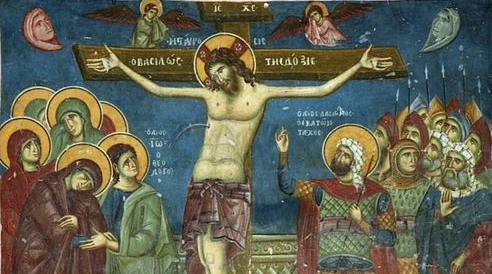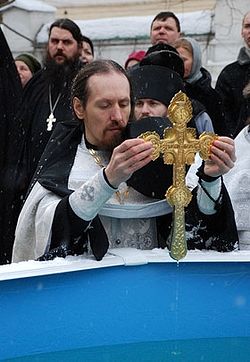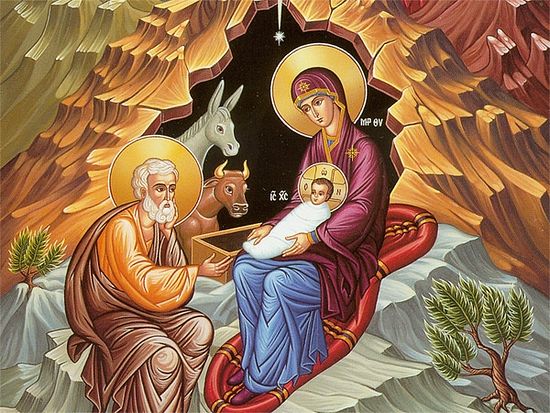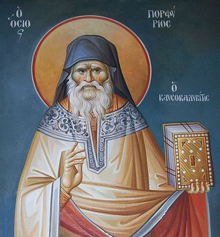Holy Week: An Explanation
 Great Lent and Holy Week are two separate fasts, and two separate celebrations. Great Lent ends on Friday of the fifth week (the day before Lazarus Saturday). Holy Week begins immediately thereafter. Let’s explore the meaning of each of the solemn days of Passion Week.
Great Lent and Holy Week are two separate fasts, and two separate celebrations. Great Lent ends on Friday of the fifth week (the day before Lazarus Saturday). Holy Week begins immediately thereafter. Let’s explore the meaning of each of the solemn days of Passion Week.
Lazarus Saturday: Lazarus Saturday is the day which begins Holy Week. It commemorates the raising of our Lord’s friend Lazarus, who had been in the tomb four days. This act confirmed the universal resurrection from the dead that all of us will experience at our Lord’s Second Coming. This miracle led many to faith, but it also led to the chief priest’s and Pharisees’ decision to kill Jesus (John 11:47-57).
Palm Sunday (The Entrance of our Lord into Jerusalem): Our Lord enters Jerusalem and is proclaimed king – but in an earthly sense, as many people of His time were seeking a political Messiah. Our Lord is King, of course, but of a different type – the eternal King prophesied by Zechariah the Prophet. We use palms on this day to show that we too accept Jesus as the true King and Messiah of the Jews, Who we are willing to follow – even to the cross.
Monday of the First Week of Great Lent
True fasting is putting away evil deeds
St. Basil the Great
The meaning of fasting consists not simply in refusing meat and dairy products, but most importantly in profound self-knowledge, repentance, and the struggle with the passions. “Let us tear every unrighteous union,” the Church hymns call to us on these days. “If we refrain from meat but devour our neighbors, this is a mockery of the fast,” says patristic wisdom. The true meaning of the fast is clearly revealed in one of the stichera: “Let us abandon bodily passions, and grow the gifts of the soul…” “The Springtime of repentance” is what people in the Church call the time of Great Lent.
The first week of Great Lent is the strictest. Thus, according to the rule, food is taken only after the Liturgy on Wednesday. Of course, this requirement is relaxed for the sick, infirm, aged, and pregnant or nursing mothers, with the blessing of their spiritual fathers. Nevertheless, even the strictest bodily abstinence without prayer, like a plowed but unsown field, will bring forth nothing but weeds.
About Holy Water
 On Theophany, that is, the Day of the Lord's Baptism, every year a great miracle is performed. The Holy Spirit, coming down upon the water, changes its natural properties. It becomes incorrupt, that is it does not spoil, remains transparent and fresh for many years, receives the grace to heal illnesses, to drive away demons and every evil power, to preserve people and their dwellings from every danger, to sanctify various objects whether for church or home use. Therefore Orthodox Christians with reverence drink Holy Water - a great Agiasma (holy thing), as the Greeks call it.
On Theophany, that is, the Day of the Lord's Baptism, every year a great miracle is performed. The Holy Spirit, coming down upon the water, changes its natural properties. It becomes incorrupt, that is it does not spoil, remains transparent and fresh for many years, receives the grace to heal illnesses, to drive away demons and every evil power, to preserve people and their dwellings from every danger, to sanctify various objects whether for church or home use. Therefore Orthodox Christians with reverence drink Holy Water - a great Agiasma (holy thing), as the Greeks call it.
One should always have at home enough Theophany water so that it will last the whole year, and make use of it at every need; in cases of illness, leaving on a journey, whenever one is upset, students when going to examinations. They do well who daily, before eating any kind of food, drink a little Holy Water. It strengthens the powers of our soul - if it is done, of course, with prayer and reverence, and one does not merely expect from it a mechanical result.
Homily on the Birth of Christ by St. Philaret of Moscow (Given by Archimandrite Philaret in the St. Alexander Nevsky Lavra)
 Great is the mystery of godliness, God was manifest in the flesh (I Tim. 3:16)
Great is the mystery of godliness, God was manifest in the flesh (I Tim. 3:16)
The New Adam comes forth from virgin earth. Woman, the source of the curse, bears the dew of blessing. The true Noah has appeared, Who shall comfort us concerning our work and toil of our hands, because of the ground which the Lord hath cursed (Gen. 5:29). Melchizedek, without father, without mother, without descent (Heb. 7:3), comes to inherit the eternal Kingdom and Priesthood. The long night of fear and universal expectation finally passes, and the morning light penetrates the darkness of the Old Testament Sanctuary, opened not daily, but eternally to the East. The Heavenly Manna is poured forth from the vessel which contained it. The rod of Jesse blossoms forth in place of the fading rod of Aaron. Christ is born.
The Humility and Piety of St. Porphyrios of Kavsokalyvia
 On November 19/December 2 the holy Orthodox Church commemorates the recently-glorified God-bearing elder of our times, St. Porphyrios of Kavsokalyiva, who reposed on this day in 1991. He was known as a humble ascetic with the gift of foresight who always served the Divine Liturgy with compunction. In his memory we offer below his final letter, as well as an audio recording of his heartfelt serving of the Divine Liturgy.
On November 19/December 2 the holy Orthodox Church commemorates the recently-glorified God-bearing elder of our times, St. Porphyrios of Kavsokalyiva, who reposed on this day in 1991. He was known as a humble ascetic with the gift of foresight who always served the Divine Liturgy with compunction. In his memory we offer below his final letter, as well as an audio recording of his heartfelt serving of the Divine Liturgy.
While at the Holy Skete of Kavsokalyvia on Mt. Athos, the Elder Porphyrios had given orders for his grave to be dug. Through a spiritual child of his, he dictated a farewell letter of advice and forgiveness to all his spiritual children.

